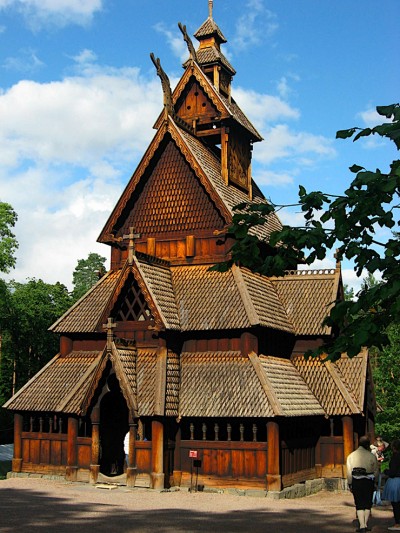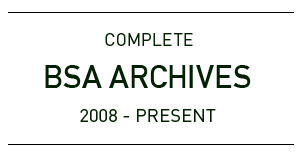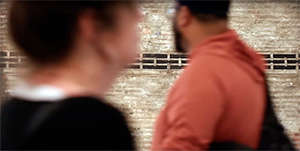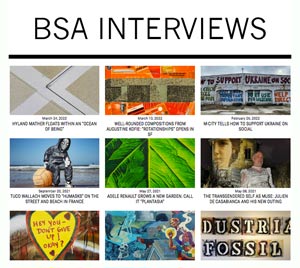Aerosol, Arsenic and Squared-Jawed Vikings
Forging Identity in “Identifiable Reality”
 “Visual Thought”, by H. Veng Smith (photo © Jaime Rojo)
“Visual Thought”, by H. Veng Smith (photo © Jaime Rojo)
A traditional A-frame wooden easel smacked up with street art stickers sits in a tiny pitched roof attic studio. The focused artist sits, poised brush in hand, staring intently at his palette of carefully selected and mixed pigments with linseed oil, deciding how to recreate a spray painted tag by Street Artist Dark Cloud onto the stone walled bridge in his canvas.
“With these pieces I’m more interested in trying to have fun with them. I want to give you a reality, but at the same time an alternate reality,” so explains Veng of Robots Will Kill, now H. Veng Smith. The name itself indicates his desire to consolidate two extremes in his career so far – “Veng” from his days as a graff/street artist and member of the New York collective Robots Will Kill – and the formal name “H. Smith” under which he first showed his finely rendered oils on canvas.
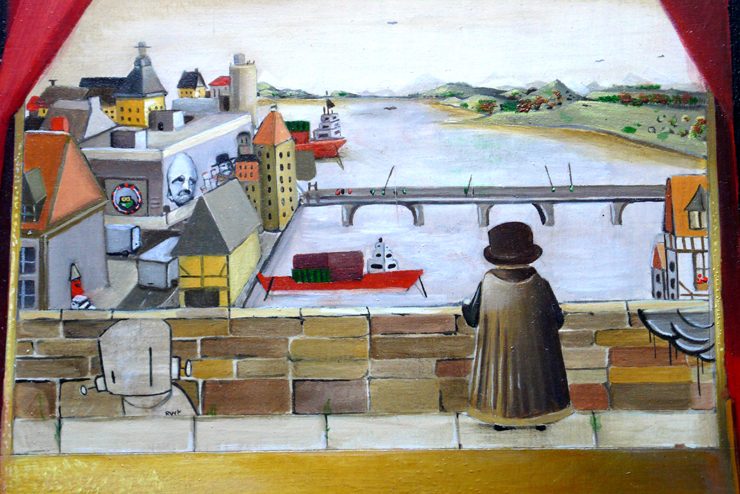 Detail from “Visual Thought”, by H. Veng Smith (photo © Jaime Rojo)
Detail from “Visual Thought”, by H. Veng Smith (photo © Jaime Rojo)
As Veng painted canvasses over 3 months for his first solo show as a “Street Artist” on display indoors at Pandemic Gallery this Friday, he found himself again reconciling his two distinct interests – graff culture and the Dutch Masters. Looking at the oil painting of a survey of the expanse of a river alongside a non-descript European town from perhaps a few centuries ago, you see he has included tags from Street Artists circa 2010 like ECB, Chris from RWK, and Dark Cloud on walls in the village.
Brooklyn Street Art: I like the way that you pay homage to street artists and graffiti artists in these formal, painterly, old-world settings
 Veng: That to me is the ideal world. I really enjoy that piece because it mixes the things that I like all in one. It’s got the street art, which I like, it’s got the graffiti, which I like, it’s got some modern conveniences like trucks moving because obviously you need to drive. I don’t want to be sitting around with a horse and buggy or something. Airplanes…. I like my laptop. At the same time I like the simple quiet old times, and the ideas of them, the old buildings. You know if you look at the city today I don’t think it looks as nice as it did a hundred years ago or in the 1800’s. If you go to some of the old Brooklyn or Manhattan buildings, you see that they’re beautiful. And the Manhattan skyline is beautiful too – it’s world-famous obviously. But I’m for classy, rustic, old world aesthetics. And I hope that’s what you get when you look at these pieces.
Veng: That to me is the ideal world. I really enjoy that piece because it mixes the things that I like all in one. It’s got the street art, which I like, it’s got the graffiti, which I like, it’s got some modern conveniences like trucks moving because obviously you need to drive. I don’t want to be sitting around with a horse and buggy or something. Airplanes…. I like my laptop. At the same time I like the simple quiet old times, and the ideas of them, the old buildings. You know if you look at the city today I don’t think it looks as nice as it did a hundred years ago or in the 1800’s. If you go to some of the old Brooklyn or Manhattan buildings, you see that they’re beautiful. And the Manhattan skyline is beautiful too – it’s world-famous obviously. But I’m for classy, rustic, old world aesthetics. And I hope that’s what you get when you look at these pieces.
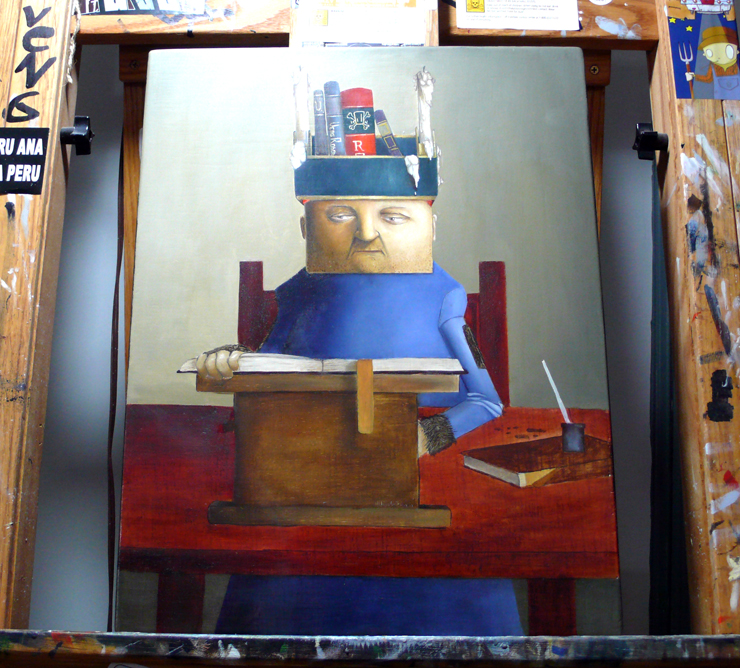 “Jerome”, by H. Veng Smith (photo © Jaime Rojo)
“Jerome”, by H. Veng Smith (photo © Jaime Rojo)
“Identifiable Reality”, his first solo show as a Street Artist will showcase his own version of reality, which is to say, fictional.
Brooklyn Street Art: What does the title of the show refer to?
Veng: Just to all the pieces in the show that are realistic – you know what you are looking at, nothing is abstract in the design. But at the same time the ideas are a little abstract. You don’t usually see somebody with a hat made of books on their head with candles. Even though the candles on the hat is a realistic idea, because in olden days they would put candles on their hats for visibility to paint at night. Michelangelo and Goya both wore hats with candles when they were painting. A lot of people assume that this is all fantasy but it is not completely fantasy.
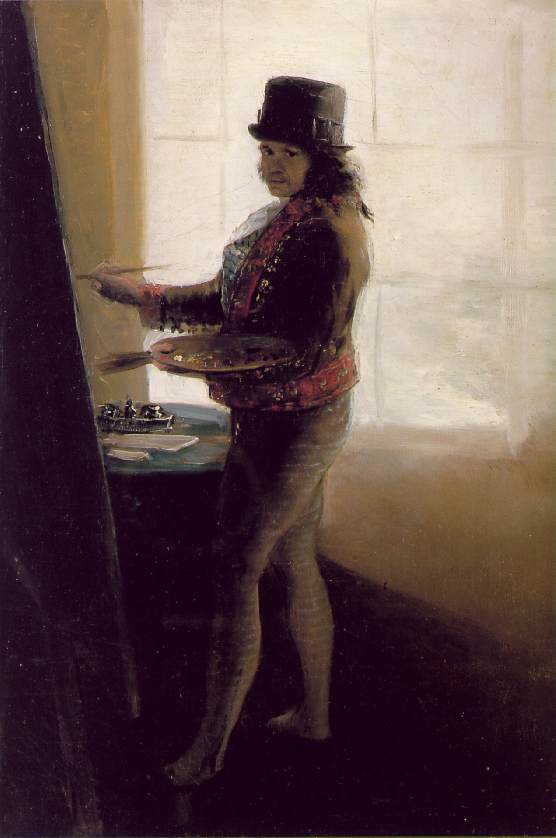 Goya’s ” Self-Portrait in the Workshop”, 1795, shows the artist with candles in his hat. (Courtesy Museo de la Real Academia de Bellas Artes, Madrid)
Goya’s ” Self-Portrait in the Workshop”, 1795, shows the artist with candles in his hat. (Courtesy Museo de la Real Academia de Bellas Artes, Madrid)
Out the open hinged window comes the sound of two Black-capped Chickadees calling each other in the branches of the blazing fall yellow trees. The conversation turns to the poker-faced man who appears throughout his giant street pieces and in these smaller canvasses. Veng calls the reappearing ever morphing costume-changing dude his “character”, and his blunt center stage presence is always beguiling with a hint of the comic. Truthfully, these “characters” are all probably versions of Veng, exhibiting different qualities of his own character, if only slyly.
Detail of “Jerome”, by H. Veng Smith (photo © Jaime Rojo)
Brooklyn Street Art: In a lot of your work there is a healthy dose of humor, however subtle.
Veng: Yeah – I wouldn’t consider it too serious. It’s kind of playful.
Brooklyn Street Art: Your character for example; It’s got this expression in this piece. What is that expression? Is he tasting a sour lemon?
Veng: He’s an unhappy Viking. You know, he’s plundering and he’s just not in the best of times I guess.
Brooklyn Street Art: I’ve noticed the shape of the face of the character has now become completely square, even with corners now.
Veng: I started off doing a more circular shape and I like it because it is recognizable and I always want to stick to more simple shapes, and I like them to be unrealistic. So no matter how realistically you paint an eye or a nose, no matter what you ever do to it, it is never going to look real because the shape alone is going to kill that for you totally. I would never use, say, a triangle or something. I like the idea of having that clean edge circular or square shape to break up the reality that you might otherwise get. I think it separates it from other things that are going on. I could sit here and do all of these with more realistic facial proportions but I feel like, for me, it would take out some of the fun of the character.
Brooklyn Street Art: And in fact, the character is fun.
Veng: Yeah, you look at first and it almost looks “identifiable” but then you realize it’s completely square. You take away the eyes and nose …..
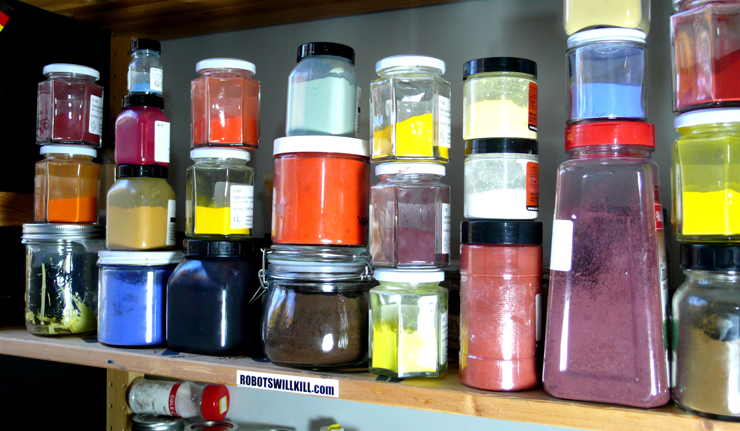 (image © Jaime Rojo)
(image © Jaime Rojo)
For a minute you forget you are talking to a well known aerosol wielding Brooklyn Street Artist in this cozy Staten Island hideaway. It’s stillness is free of clutter and there are neatly stacked glass jars of pigment, oils, a mortar and pestle. Reconciling these two worlds must be work in itself.
Brooklyn Street Art: Recently there was a show at 17 Frost Gallery with Erik Burke & Cahil Muraghu where they married graffiti techniques and vocabulary with the Hudson School of painting. When I saw some of their pieces I was impressed and I was also thinking of the way that you are marrying two styles are a few centuries apart from one another.
Veng: You know if you look at the books I have on my shelf, people usually get a kick out of it because there will be a Chuck Close book next to a book on Jan van Eyck, or some Dutch guy. I personally find great interest in all of them and I reference them and I think when you can combine them using creativity it is a great luxury. Technique-wise, we have a lot to learn from the past.
Brooklyn Street Art: I’ve heard you talk before about having within your style these polar opposites and you’ve withstood some criticism from people like your peers for example. When you were doing graff on the street and you started to do Street Art based stuff – let alone Dutch Masters influenced pieces- what were some of the responses you were getting?
Veng: It’s definitely been tougher from the graffiti crowd than the Street Art crowd. But the graffiti crowd, especially here in New York, has loosened up on it’s ideas basically due to a lot of Europeans coming over doing graffiti too. The graffiti scene was always sort of A-B-C-D.
Brooklyn Street Art: In what way?
Veng: You spray paint, you use your caps, that’s it. You do it illegally, you never get too artsy. Whereas with Street Art, you can kind of get almost as artsy as you want.
Brooklyn Street Art: So you are saying that those people who might have given you a hard time before might not be doing it now.
Veng: Now they don’t do it at all. But at the same time, a lot of people won’t consider it graffiti. They’ll say, “Oh, he uses spray paint to do it but it’s not graffiti”. So I think a lot of the borders have all been cut down.
Brooklyn Street Art: So would you say a certain level of respect exists across all of it?
Veng: Yeah. I mean I’ve always been pretty peaceful and I’m pretty easy going. I’ve never really had any personal problems. I mean some people give their opinions, which is fine obviously, because not everybody likes everything the same and thank God.
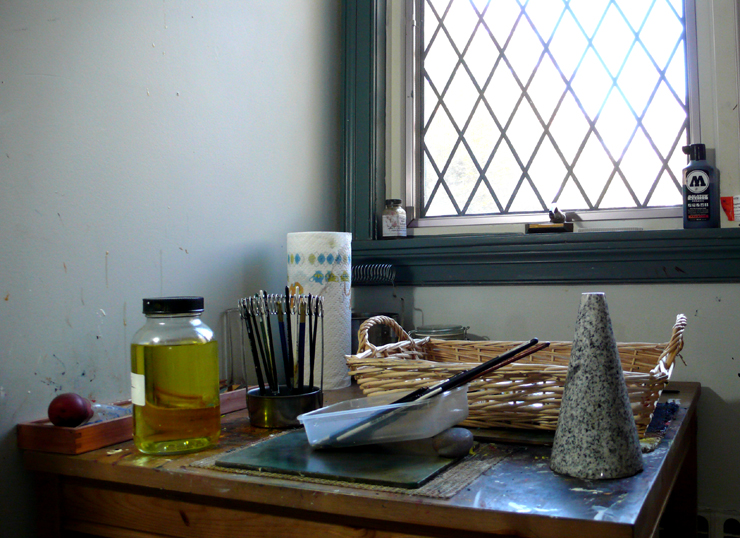 (image © Jaime Rojo)
(image © Jaime Rojo)
Brooklyn Street Art: So you pick all of your paints.
Veng: Yeah, a lot of the paints, about 85% of them, I mix myself from the pigments. There are certain pigments I don’t use.
Brooklyn Street Art: What do you mix the pigments with
Veng: Oil – linseed oil or possibly walnut oil. – Which you can kind of smell in here. And then I add to them different stuff like resin, which will speed up the drying and give it a glossy hardened feel.
Brooklyn Street Art: Where do you get your pigments and supplies?
Veng: A lot of the supplies I get from a local colorman in Brooklyn, Robert Doak in Dumbo. His business has been around longer than I’ve been living. A lot of the pigments and materials I use come from him. It’s really specific, not just to oil paintings but to traditional materials. Also I get a lot of stuff from a company out in California called Natural Pigments, which specializes in all the hard-to-find pigments. Also I use the more dangerous stuff like lead-based paints and paints that contain arsenic.
Brooklyn Street Art: Really? Arsenic?
Veng: Yes, it’s a color called Opiate. It’s a really gorgeous yellow, but it contains arsenic.
Brooklyn Street Art: So do you have to wear a mask using some of these pigments?
Veng: When I mix the pigments I have little dust mask on for the super dangerous ones. – Not that I feel like I really need one because I’m dealing with it in very small doses. Obviously I don’t have the window open in front of me or the fan going. But just to be on the safe side I do wear a dust mask. Some are more dangerous if absorbed through the skin. Like Vermillion – (takes the glass bottle to show) – it’s a really really nice red. But if you absorb it through your skin it’s dangerous.
Brooklyn Street Art: This is a pestle.
Veng: It’s a grinder for the paints. You put it on here with the oil. Here are different oils, here is the walnut you can smell if you want.
Brooklyn Street Art: Yeah I think I can smell the linseed. That is really understated. I think people use linseed oil for furniture.
Veng: Yup, linseed oil – if you would ask people, probably 80% of them use linseed oil for their paints.
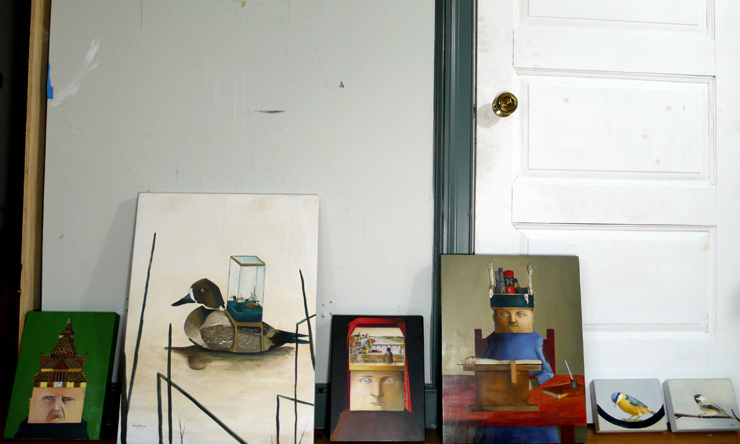 A partial lineup of pieces by H. Veng Smith (photo © Jaime Rojo)
A partial lineup of pieces by H. Veng Smith (photo © Jaime Rojo)
Brooklyn Street Art: How does it feel doing a solo show?
Veng: It feels great. I’m nervous. I hope everyone enjoys the work and likes it and shows up. It’s been good to get a body of work together in this genre because I’ve never really had a full collection of these pieces before that is more influenced by my Street Art. I’ve done a single piece for a commission or a group show here or there. So I’m really excited putting them together and coming up with similar ideas, breaking them down into groups, and having them all come together.
Finally it’s like a family of these street art pieces. To be honest I’ve never seen so many of these character paintings together in the studio.
Excerpt: Painting Birds
Veng photo © Jaime Rojo
 A Nuthatch by H. Veng Smith (photo © Jaime Rojo)
A Nuthatch by H. Veng Smith (photo © Jaime Rojo)
“I think they are the neatest things to paint. They give you all sorts of texture, they give you colors. I just think that technically they are great to paint, they give you the details, you can keep them super rendered. I’ve always been a big fan of birds in general – watching them, taking pictures of them. When I lived in Pennsylvania I did a lot of bird watching. So I just like them in general, and to paint them it’s a lot of fun and so far people have shown a lot of interest in my birds.”
“Alone in Thought” by H. Veng Smith (photo © Jaime Rojo)
Excerpt: Swedish/Norwegian Architecture
“Gotland” by H. Veng Smith ( photo © Jaime Rojo)
We had relatives from Sweden here and they gave me this tile, which has a Stave church in it, which I thought was really great. So I looked up these churches and they all have these really good architectural features, so I did my character like them. It’s a church. Instead of saying church building, you would say “stave”
Norwegian Stave Church (photo © Sue Renault)
“I thought the buildings looked amazing so I automatically thought of putting it in. I just like the old wooden buildings like that. They are fun to paint and not a lot of people reference stuff like this. It’s not secret, everything I have at home is kind of European, or fantasy based. But at the same time, this church is an actual architectural design that exists.
Detail of “Gotland” by H. Veng Smith ( photo © Jaime Rojo)
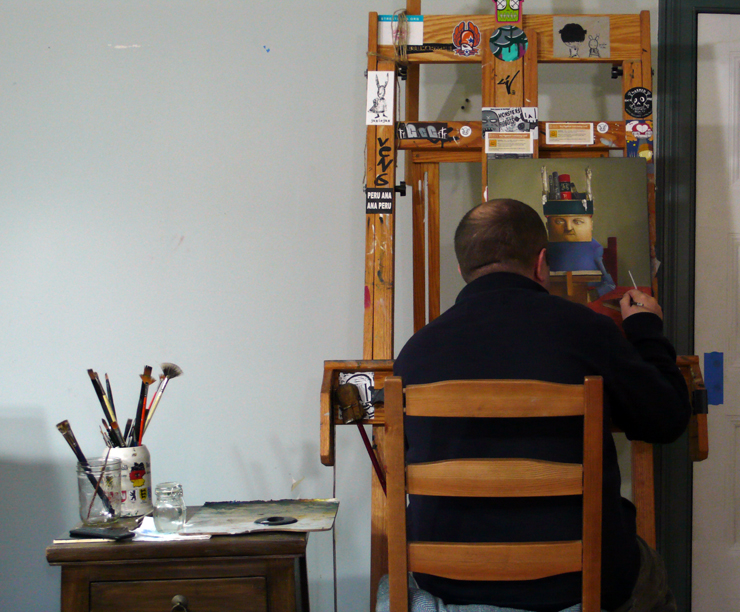 Portrait of the Artist by Jaime Rojo ( © Jaime Rojo)
Portrait of the Artist by Jaime Rojo ( © Jaime Rojo)
BSA…………………….BSA…………………….BSA…………………….BSA…………………….BSA…………………….BSA…………………….
“Identifiable Reality” at Pandemic Gallery with H. Veng Smith
Friday December 17, 2010, 7-9 pm
Other Articles You May Like from BSA:
The Italian Bifido is back with his photographic surrealist scenarios, this time from the Fate Festival in San Potito Sannitico, a tiny town of about 2,000 in the south of Italy. Reacting to the refug...
The 7th edition of the RUA Mural Festival arrives in Estonia's Elva Municipality, changing the visual landscape of Elva and five surrounding villages: Rõngu, Annikoru, Valguta, Puhja, and Aakre. Runn...
Sometimes an enterprising artist creates their own initiative in a city and invites friends to come and paint walls that they secure – a small campaign or informal "festival, if you will. SEPE. OD...
“Done!” comes the text from Rubin, who is floating on his scissor lift six feet above the line of people down Kent Avenue that is cued along Aakash Nihalani’s new wall for the public opening of Kara W...
Official kick-of for release of the book "Get up again: Forty years later" by Craig Castleman Nearly Forty years after his seminal book “Getting Up: Subway Graffiti In New York” was released, ...
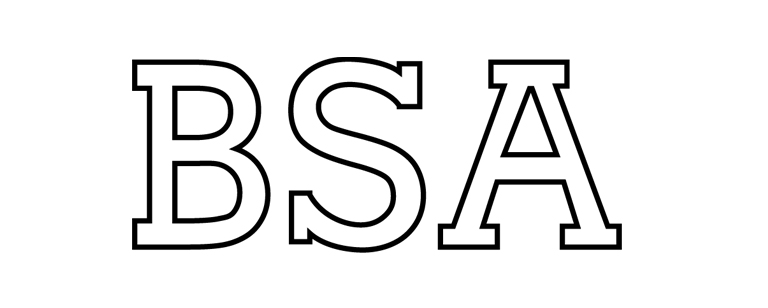 BROOKLYN STREET ART LOVES YOU MORE EVERY DAY
BROOKLYN STREET ART LOVES YOU MORE EVERY DAY